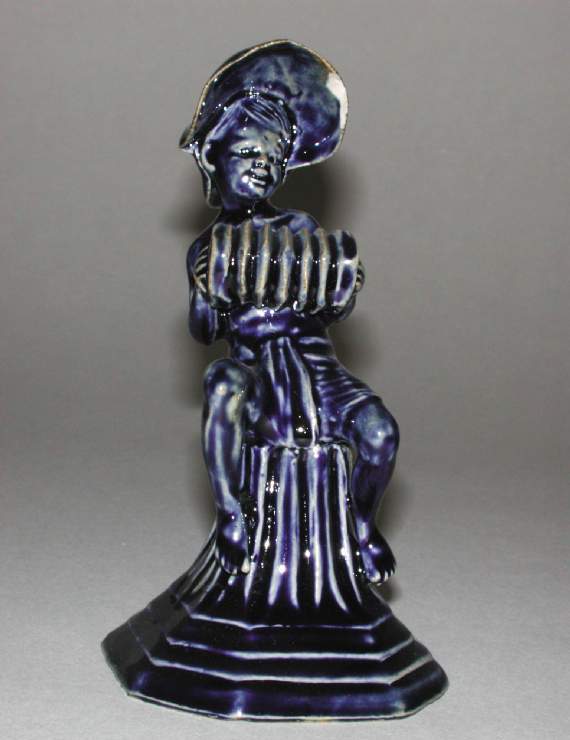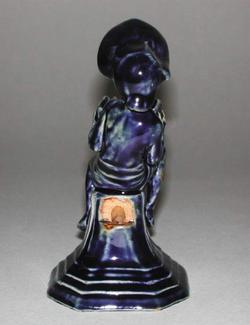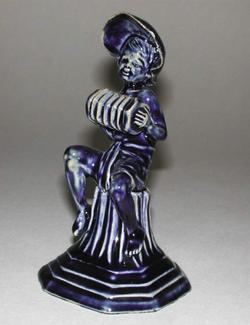Current Location: In storage
Titles
Boy playing a concertina
Maker(s)
Pottery:
Doulton & Co.
Modeller:
Tinworth, George
Assistant:
Atkins, Elizabeth
(Possibly)
Entities
Categories
Description
Stoneware figure covered with dark blue salt-glaze.
A boy sits on a pedestal, playing a concertina. The octagonal base is moulded to form three shallow steps at the top surrounding a short, ridged pedestal. The boy is hand-modelled, with face, fingers and toes finely detailed. He wears a wide-brim hat and loin-cloth. The whole is covered in cream slip and a thin covering of dark blue glaze, so that the cream colour shows through on the face and on the sharp edges of the pedestal and concertina. A square cut has been made into the back of the pedestal and a hole drilled through into the hollow base. The underside is unglazed, except for the rim.
Notes
History note: Low, Foulsham & Coles. Bought on 9 February 1925 for £1.10/- (one pound ten shillings) by Dr Glaisher, Trinity College, Cambridge
Legal notes
Dr J.W.L.Glaisher Bequest
Measurements and weight
Depth: 6.4 cm
Depth: 2.5 in
Height: 12.1 cm
Height: 4.875 in
Width: 6.5 cm
Width: 16.7 in
Acquisition and important dates
Method of acquisition: Bequeathed
(1928-12-07)
by
Glaisher, J. W. L., Dr
Dating
19th Century, Late
Victorian
Circa
1880
CE
-
1890
CE
Note
Doulton and Co, founded c.1815, originally made utility ceramics, with some stoneware jugs and bottles. In the mid 1860s, Henry Doulton introduced decorative stoneware and architectural terracotta and, over the next 50 years, employed some 400 artists, many of them Lambeth School of Art students. Doulton championed individuality, innovation and versatility, and his modellers and decorators used a wide range of techniques and decorative treatments in producing both unique, artist-signed, and limited edition pieces. From 1872 the business expanded into faience and in the 1880s opened a factory at Burslem, Staffordshire, where bone china and other wares were made. In 1901, Edward VII granted the Royal warrant to the factory. Stoneware production at Lambeth reduced after 1914, and ceased in 1956.
George Tinworth (1843-1913 ) worked for his father, a wheelwright, whilst he studied modelling at Lambeth School of Art and the Royal Academy. He worked at Doulton & Co from 1866-1913, where he lead the introduction of decorative salt-glazed stoneware. His most important commissions were terracotta relief panels, of which he made some 500, including a reredos at York Minster and work for the Guards Chapel.
The Doulton mark on the underside suggests the figure was modelled in the 1880s, and, as Dr Glaisher wrote, ‘it is difficult to think that it is not Tinworth’s work’. But it is unsigned. Rackham (1935) gives a date of 1914, noting that 'according to information given by Messrs. Doulton (1932) the monogram is that of a 'repairer' (name unrecorded) employed to produce one small batch of figures from Tinworth’s moulds after his death, before their destruction'. The incised initials indicate that this may have been the Doulton ware assistant Elizabeth Atkins.
This group is related to a series of boy musicians, playing over 35 instruments, which Tinworth made between 1889-1912; he also made anthropomorphic mice and frogs; and similar studies set around salt-cellars. These were usually brown salt-glazed; it is very rare to find a blue piece. The hole in the back suggests that, as Dr Glaisher’s notebook entry says, the figure was probably made for use as a menu-holder.
School or Style
Art Pottery
People, subjects and objects depicted
Components of the work
Part
Materials used in production
Salt-glaze
Stoneware
Techniques used in production
Salt-glazing
Inscription or legends present
Inscription present: circular Doulton seal
- Text: DOULTON LAMBETH
- Method of creation: Impressed
- Type: Mark
- Text: EA
- Method of creation: Incised
- Type: Initials
References and bibliographic entries
Identification numbers
Accession number: C.1223-1928
Primary reference Number: 71620
Old object number: 4477
Stable URI
Audit data
Created: Saturday 6 August 2011
Updated: Tuesday 30 April 2024
Last processed: Tuesday 15 July 2025
Associated departments & institutions
Owner or interested party:
The Fitzwilliam Museum
Associated department:
Applied Arts






